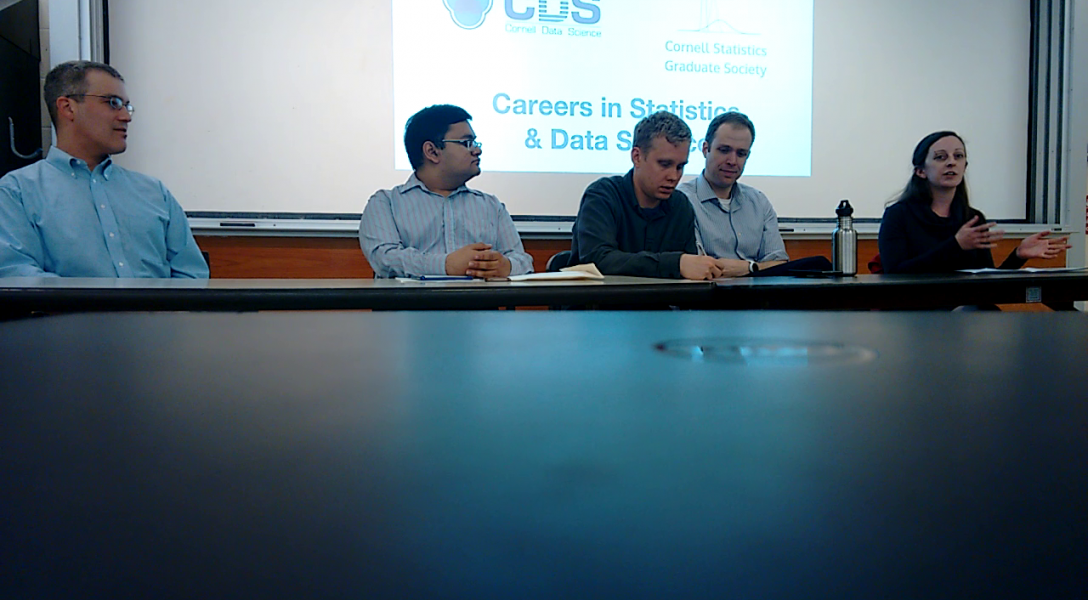Five Cornell alumni and affiliates were on-hand recently to share insights with current Big Red students about what a career in the statistics field is and what it isn't. Co-hosted by the Cornell Statistics Graduate Society and Cornell Data Science, the Career Panel for Data Science was held on Friday, May 12, and featured the following panelists:
• Kushagra Aniket, BA 2015 from Cornell, now working as a Research Analyst at Cornerstone Research.
• Daniel Fink, PhD 2002 from Cornell, now a Senior Research Associate at the Cornell Lab of ornithology.
• Sara LaPlante, MPP 2011 from the University of Chicago, currently a Statistical Analyst at the Cornell Centre for Teaching Excellence. She has prior work experience working as a statistical analyst at a range of non-profit organisations including MDRC and the New York Civil Liberties Union.
• Will Nicholson, PhD 2016 from Cornell, working as a Quantitative Research Analyst at Quantbot Technologies.
• Jon Steingrimsson, PhD 2015 from Cornell, currently a Postdoctoral Fellow in the Department of Biostatistics at Johns Hopkins University.
What's your typical work day like?
Due to the diverse work environments of participating panelists, a typical work day varied. In an academic environment, work hours tend to be pretty flexible and the day is mostly spent doing methodological research alone or with other collaborators. In a non-profit environment, like an non-governmental organization (NGO), the work is sometimes collaborative with other similar organizations but is mostly data management. Elsewhere, in other corporate workplaces, employees work closely within a team environment, holding project meetings with clients and explaining their work.
What's More Valuable, an Academic Degree or Experience?
When asked about a typical background needed to succeed in their field, those speaking from an academic perspective said that having a higher degree was essential. However, in a corporate environment, experience is valued more than academic qualifications. Why? According to panelists, a company's area of expertise is usually specialized, and academic degrees might not equip the employee with the insights that good, old-fashioned experience can. But still, panelists said academic degrees are highly valued in company areas – for instance, in research and development – and might provide an edge in today’s highly competitive job market.
What Cornell courses have proved most essential in your statistics careers?
According to panelists, almost all courses they encountered during their academic years have helped considerably in their careers, especially coding courses. Companies use different programming languages for varying purposes, they said. For official purposes, they would use proprietary software like SAS, Matlab, but for informal and preliminary programming – like running simulations – they might use openly licensed software like R and Python. Also learning more basic languages like C++ and Unix-based commands helps, too. Other than academic knowledge, communication skills are very important in the day-to-day operations in any job, let alone data science-related fields, and even more so in a corporate environment. Pursuing leadership or organizational positions on campus might be a good place to hone such soft skills, the panelists said.
Panelists: Pursue an Interdisciplinary Education
In conclusion, panelists reached a general consensus that though all of them shared a background in statistics, data science resides at the intersection of many different fields, like computer science, operations research, economics and even biological fields, to name a few. Panelists also noted that the actual definition of data science evolves, too, and might be defined differently from institution to institution. They stressed that students should pursue an interdisciplinary education during their academic years.
This event was hosted by Cornell Statistics Graduate Society and Cornell Data Science and funded in part by Cornell Graduate Assembly (GPSAFC) and American Statistical Association.



